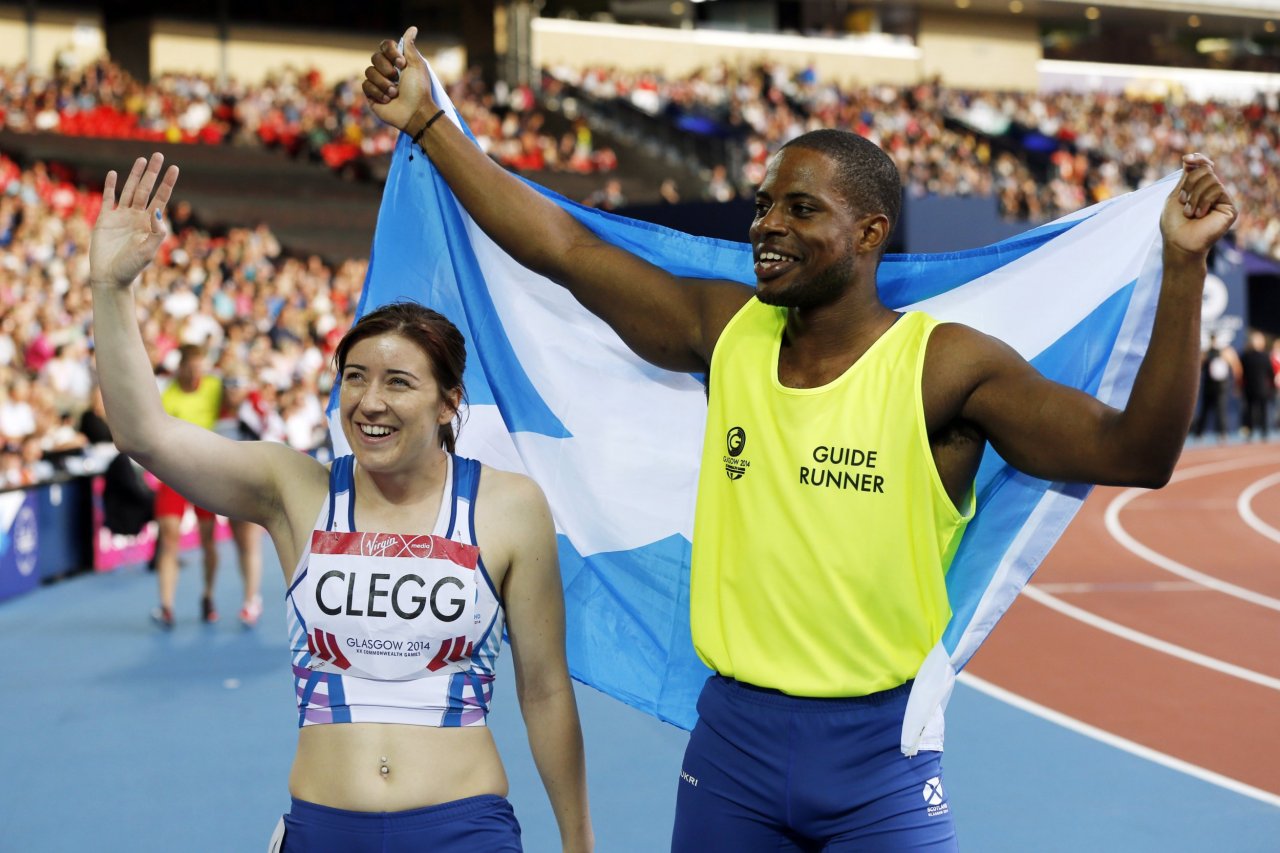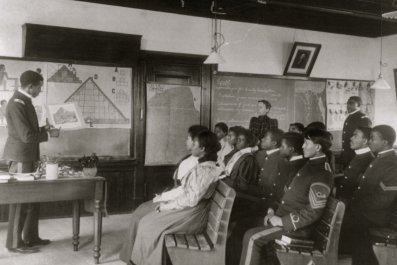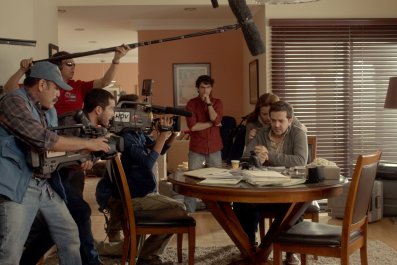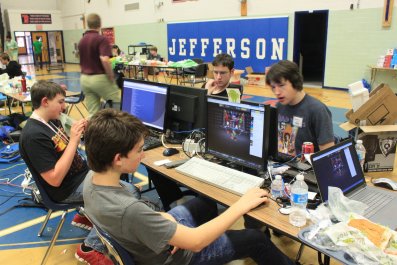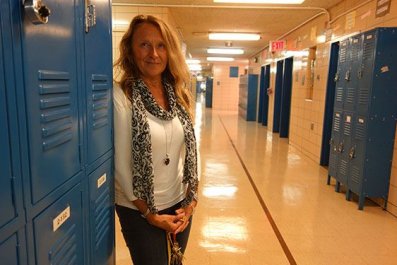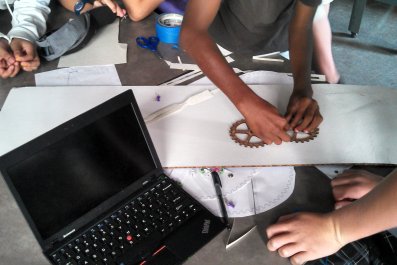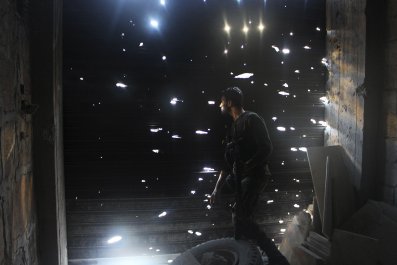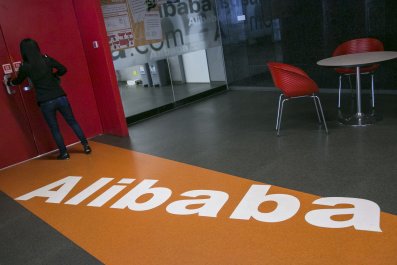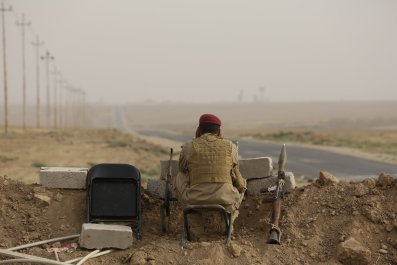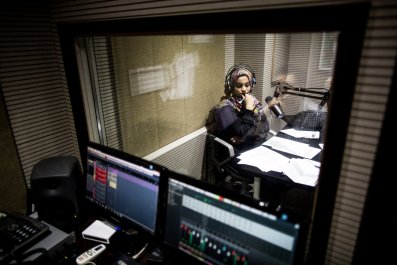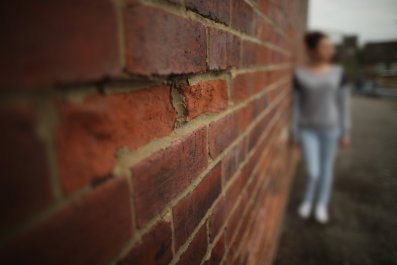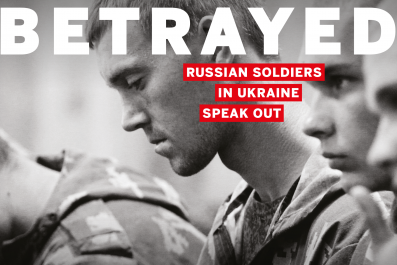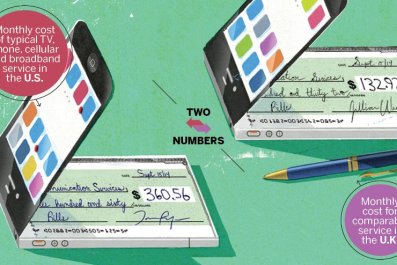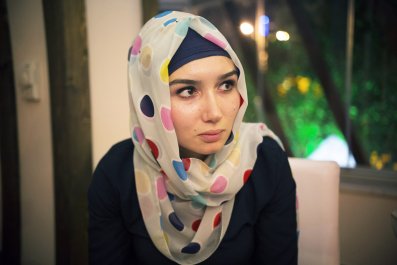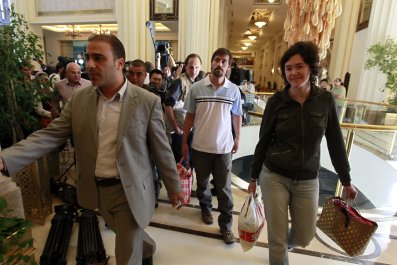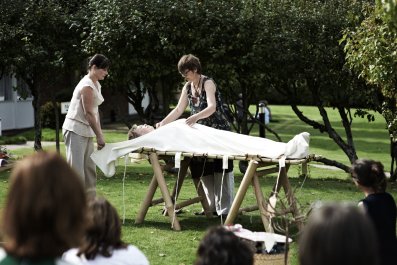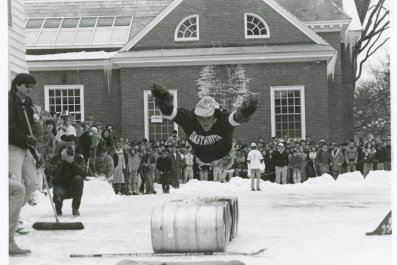A lot can happen in 12 seconds. For the blind sprinter Libby Clegg and her guide runner Mikail Huggins, it has to. Take this summer's final of the 100m race for visually-impaired athletes at the Commonwealth Games in Glasgow. When the gun fired, Clegg, who is registered legally blind, burst out of the starting block. Huggins, attached to Clegg at the wrist with a rubber rope, followed a split second later. He alerted her when she had reached 20m and 40m, ensured that she stayed in her lane, shouted at her to keep her chin up and constantly monitored his stride to make sure they moved in unison. One false step and their limbs could become entangled –"spaghetti arms", Clegg says – risking injury and costing her the race. As they approached the finish line he shouted at her when it was time to dip – and hoped for the best.
"When I crossed the line, everyone was cheering so I knew I'd won," says Clegg, a Scot who faced the additional pressure of running at a home Games. Huggins could see from the board that they had finished in 12.20 seconds, the fastest time recorded this year. He kept the news to himself. "I knew that when they announced the time it would give Libby a feeling that only she can explain," he says. "I didn't want to take that moment away from her."
As with all successful sprinters and their guides, Clegg and Huggins have a relationship built on trust. She depends on him to steer her down the track and, in the case of the 200m, around the bend. She counts on him to stay fit and avoid injury, and to make the hour-long drive to her training facility in Loughborough, where they practice together six times a week. Scoreboards and race rosters only display Clegg's surname, but it takes both of them to cross the finish line to win. The same holds true for other elite Paralympians. British blind skier Kelly Gallagher, who won gold in Sochi, speeds down the slopes at 65 miles an hour, just a few metres behind her guide. They communicate through a Bluetooth headset. Paralympic and Commonwealth Games cycling champion Neil Fachie, who was born with a degenerative eye-condition known as retinitis pigmentosa, competes on a tandem bicycle with a sighted "pilot" pedalling at the front.
To understand Clegg's experience, Huggins routinely does drills on his own with his eyes closed. "I have to put myself in that situation so when I run with her we feel as one," he says. Four years into their partnership, he now understands her so well that, in the heat of a race, he can sense changes in her posture, whether she's moving her arms correctly and whether she's about to slow down – all by the gentle tug and feel of the rope that binds them. "In football, you lose the ball but a teammate can pass it back later," he says. "If something goes wrong on the track, I've just got hundredths of a second to rectify the situation."
That's one reason Clegg believes Huggins has the tougher job: "I just have to run. He has to run and talk with me, and he has the pressure to make sure he doesn't mess up for both us."
So far, so good. With Huggins at her side, Clegg has earned golds at the World and European Championships and a silver medal at the London 2012 Paralympic Games. (They had hoped to defend their European titles at the end of August, but a viral infection forced Clegg to withdraw). He's also helped her become one of the most recognised disabled athletes in the UK, and a poster girl for sport in Scotland. "It's a very selfless thing to do, being a guide runner," Clegg says. "He's taking the limelight off himself and putting it on someone else."
At the age of nine, Clegg was diagnosed with Stargardt's Macular Dystrophy, a genetic, degenerative eye condition that has left her with only slight peripheral vision in her left eye. "My central vision isn't a black hole," she says. "It's basically like fireworks, pink and purple, all bunched up in a celebration."
Clegg's parents got her involved in running around the same time, hoping it would build her confidence. At 12, she enrolled in the Royal School for the Blind in Edinburgh and began training with the Edinburgh Athletic Club. England Athletics talent spotted her when she was 14. Two years later, during her first year sprinting, she suffered a nasty fall on the track, prompting her coaches to push for a guide runner. "I resisted because I'm quite an independent person," she says. "I was also a teenager, and a bit stubborn."
She soon got over it. Working with her first guide Lincoln Asquith, an able-bodied, former British international, allowed her to run more quickly, since she didn't have to worry about lane markings on her own. At 16, she took silver in the 200m at her first world championships, and at 18 she took silver in the 100m at the 2008 Paralympics in Beijing. At that time guide runners did not receive medals. "All the girls I compete with worship their guide runners because we can't do it without them," Clegg says. "It was a shame they weren't recognised for their role in our success."
Huggins took more time to find his calling. Growing up in Aston, an inner city area of Birmingham, he was on the verge of becoming a junior international at the age of 14. But a hamstring injury and a lack of discipline kept him from fulfilling his potential. He says he spent more time chasing girls and cutting up than he did training. Brawls led to more than a few suspensions from school. "I think it was about self-esteem and wanting a bit of attention," he says. "If things weren't going my way I'd flip out."
His turnaround from cutup to Olympic medalist started at Bodum, the Danish tableware and kitchenware company. He encountered people from all walks of life, and had to learn how to communicate eloquently about electronic garlic slicers and milk frothers. "It really gave me confidence," he says. "It's strange, but customer service calmed me down and made me more patient. I wasn't such a hot head."
Although Clegg and Huggins followed different routes to Paralympic sport, their paths crossed with Asquith. He wasn't just Clegg's first guide runner. He is also Huggins' stepfather. In 2010, Asquith asked Huggins if he'd like to take over as Clegg's guide. Huggins, who helped Asquith coach children with behavioural problems and disabilities, had observed Clegg and Asquith for years, and had unknowingly become an expert on how guides stay in sync and motivate their runners. "I had a go with a few guides before Mikail, and it didn't feel right," Clegg says. "It's like finding a partner. You know instantly whether you're going to get along or not. We just fit like a jigsaw."
To ensure that Clegg continued to receive funding from British Athletics, they'd also need results. Less than a year after they started working together, the duo headed to the World Championships in Christchurch, New Zealand. Huggins suffered a leg injury ahead of their races, and knew he couldn't steer her around the bend in the 200m. But he could still run in a straight line and convinced their team to let him guide her in the 100m. He was a nervous wreck, but didn't want to unsettle Clegg. "Just before the race I said, 'I've got to go to the toilet,'" he recalls. "I went and I was shaking. I looked in the mirror and had some serious words with myself. 'This isn't just recreation. This is Libby's career'." They ended up winning by two one-hundredths of a second in a photo finish.
The victory helped secure funding for Clegg, but not Huggins. Unlike guide runners from countries like Brazil, where guides have been generously funded for years, Huggins entered London 2012 having to work several jobs – as a coach at after school clubs, as a personal trainer and a part-time masseur. He shared a car with his mother and would frequently be late making his hour-long commute to practice.
Funding finally came in November 2013, more than a year after they won a silver medal in London. Around the same time, a Lexus dealership in Birmingham started leasing Huggins a car at a significant discount. "Before, I needed to work all these jobs to survive," he says. "Now that I'm getting some backing, I train better and I can deliver a better service."
That service isn't merely on the track. Huggins helps Clegg with more mundane matters as well. He reads her menus at restaurants, signs her into races and makes sure she is looking her best. "He'll tell me if my makeup is wrong or if he doesn't like something I'm wearing," Clegg says. Hours before the opening ceremony of the recent Commonwealth Games, he insisted that she replace her impossibly high heels with something more practical – a pair of beige flats with gold accents that he picked up for her at ASDA.



